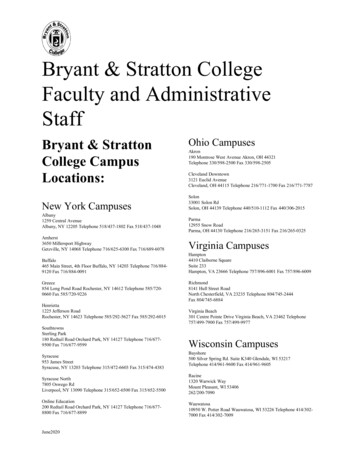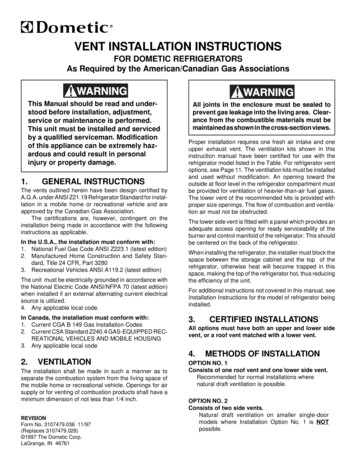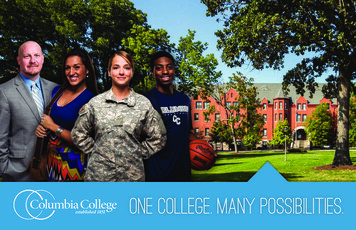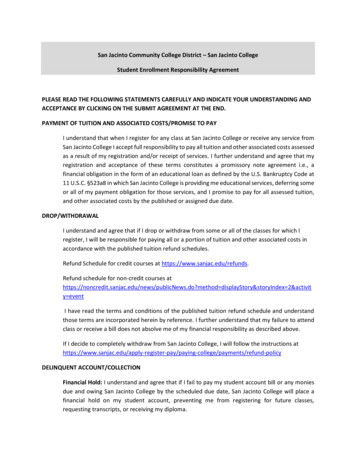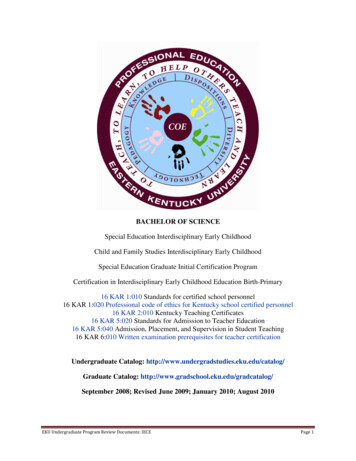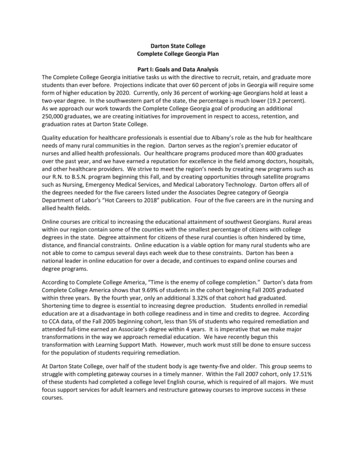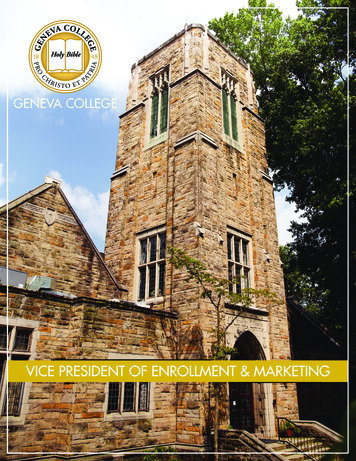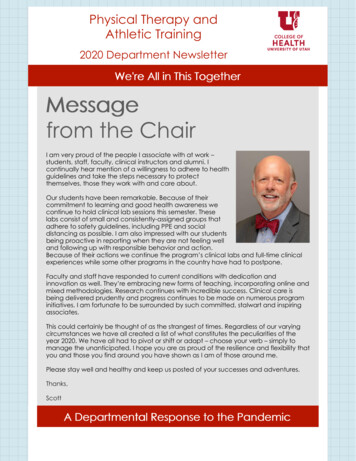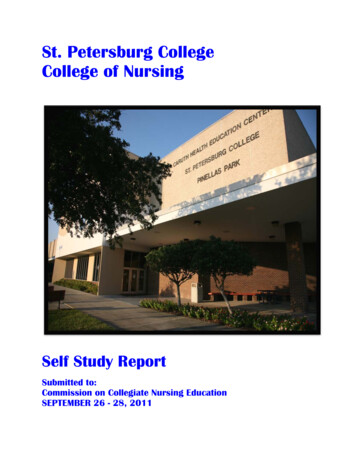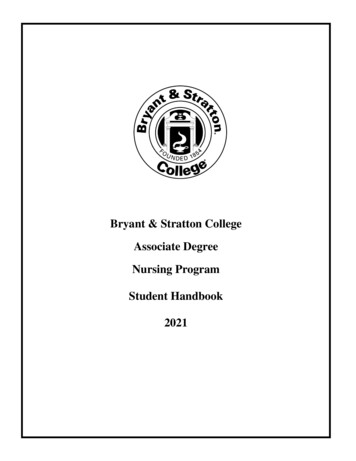
Transcription
Bryant & Stratton CollegeAssociate DegreeNursing ProgramStudent Handbook2021
Bryant & Stratton CollegeAssociate Degree Handbook2021Table of ContentsNursing ProgramApprovalCollege Mission StatementCollege Vision StatementNursing Program Mission StatementNursing Program GoalsNursing Program PhilosophyOrganizing FrameworkNursing Program Student Learning OutcomesNursing Program GovernanceNursing Program InformationNursing Program Entry and Program RequirementsHealth Requirements for the Nursing ProgramBackground Record Check RequirementsOhio Board of Nursing ScreeningWisconsin Criminal Background CheckVirginia Criminal Background CheckFederal LawUniform RequirementsEquipment RequirementsProfessional AppearanceTransportation to Clinical SiteAcademic Policies and ProceduresTransfer Credit and Proficiency CreditCourse Grading ScaleAcademic AdvisorsATI-TestingProgression through the Nursing ProgramAcceptable Achievement in Nursing CoursesRepeat of a Nursing CourseGrade AppealNon-Grade Related Grievance ProcessProgram Jeopardy StatusRelease from the Nursing ProgramRe-entry into the Nursing ProgramAttendance PolicyCompletion of the Nursing ProgramMedication Calculation CompetencySupervision of a Student in ClinicalSafe Nursing Practice DefinitionUnsafe Practice ProceduresProfessional Student ConductSubstance AbuseStudent ConductProfessional Licensure Application ProcessStatement of ConfidentialityStudent Health and Counseling ServicesStudent Illness or Injury PolicyAccidental ExposureFees and ExpensesCurriculum PlanStudent Acknowledgement of HandbookCreated 8-3-14, Revised 1-7-15, Revised 4-30-15, Revised 9-3-15, Revised 9-8-15, Revised 1-6-15, Revised 3-23-16, Revised 4/5/2016, Revised8/11/2016, revised 11-21-16, revised 12-02-16, revised 4/13/17, revised 8/11/2017, 8/24/17, revised 11/13/17, revised 1/5/18, revised 4/2/18, revised7/10/18, revised 7/26/18, revised 12/13/18, revised 4/25/19, revised 8/14/19, 1/6/2020, 7/13/2020; 8/28/2020, 1818181819192020232323242424262627272728282829302
Bryant & Stratton CollegeAssociate Degree Handbook2021The information in this handbook is NOT A CONTRACT with students and is subject to change atany time without notice. Students will be notified of new policies or changes to present specificnursing policy and procedures via e-mail by the Nursing Program Director. Questions regardingupdates may be directed to the Nursing Program Director. If any information in this handbookconflicts with the State or Federal Statute, Rules, or Regulations, the State or Federal Statutes, Rules,or Regulations will control.I. About the Nursing ProgramThis handbook was developed to provide faculty and students in the Nursing Program with informationand answers to questions concerning the Nursing Program at Bryant & Stratton College. Included inthis handbook:a. Program-specific informationb. Academic policies and procedures relating to the Nursing ProgramStudents who deviate from the requirements and obligations set forth in this Handbook and inthe Official Catalog are subject to appropriate action including suspension or dismissal from theCollege and release from the Nursing Program.ApprovalThe Nursing Program is approved by the Ohio Board of Nursing, the Wisconsin Board of Nursing,and the Virginia Board of Nursing. The Nursing Programs in Hampton and Virginia Beach haveinitial approval by the Virginia Board of Nursing.College Mission StatementBryant & Stratton College offers a personalized career education and experience leading to highdemand professions so graduates are prepared for their career and life pursuits.College Vision StatementBryant & Stratton College will offer a personalized and customized career education and experienceleading to high-demand professions so graduates adapt to 21st century career and life pursuits.Nursing Program Mission StatementThe mission of the Associate Degree of Nursing program of Bryant & Stratton College NursingProgram is to prepare safe and effective entry level registered nurses through relevant, high quality andcontemporary nursing education.Nursing Program Goalsa. Prepare Associate of Applied Science in Nursing graduates to function in professional registerednursing roles.b. Provide a foundation of learning which promotes integration of clinical decision making processesinto the provision of nursing care for meeting the health/illness needs of patients across the lifespan.Created 8-3-14, Revised 1-7-15, Revised 4-30-15, Revised 9-3-15, Revised 9-8-15, Revised 1-6-15, Revised 3-23-16, Revised 4/5/2016, Revised8/11/2016, revised 11-21-16, revised 12-02-16, revised 4/13/17, revised 8/11/2017, 8/24/17, revised 11/13/17, revised 1/5/18, revised 4/2/18, revised7/10/18, revised 7/26/18, revised 12/13/18, revised 4/25/19, revised 8/14/19, 1/6/2020, 7/13/2020; 8/28/2020, 4/30/20213
Bryant & Stratton CollegeAssociate Degree Handbook2021Nursing Program PhilosophyThe Bryant & Stratton College nursing program subscribes to and functions within the mission of BSCto deliver outcomes-based nursing education through a flexible contemporary curriculum in apersonalized environment with emphasis on authentic and experiential education. In addition, thecurriculum incorporates our values that advocate patient-centered care, teamwork and collaboration,evidence based practice, quality improvement, safety, and informatics.The four concepts of the nursing meta-paradigm that include, person, health, environment, and nursingprovide the foundation of the total nursing program.Person is defined as the individual who may be well or ill, and includes family and community. Webelieve that the person is a biopsychosocial, cultural, and spiritual being who grows, develops, andadapts throughout the lifespan. We also believe that all people, as members of the global society areendowed with intellectual capabilities which direct them toward uniqueness, autonomy, and selffulfillment. The faculty recognize the importance of respecting the dignity of the person as well asproviding an atmosphere that is supportive, caring, and responsive.Health is a dynamic human experience that is a combination of wellness-illness and is defined by theperception of the person across the lifespan. Each person perceives health in a unique manner accordingto developmental stage, cultural context, spirituality, preferences, and health literacy. The facultyendeavor to provide students with the opportunity to assume new nursing roles in health education,wellness, prevention, and provision of care to patients who have healthcare needs.Environment is a system that provides the framework for interactions to address a person’s needs andgoals. It is inclusive of physical surroundings as well as local, regional, national, global, social,political, emotional, psychological, and economic conditions that are associated with a person’s health.Environment also includes intellectual, cultural, and spiritual aspects affecting the whole person. Thefaculty affirm that the unique responses by the individual or family to constant interaction with theenvironment results in varying degrees of health.Consistent with faculty beliefs, nursing is an essential healthcare professional discipline that focuses onthe art and science of holistic healthcare guided by the values of caring, diversity, excellence, integrity,ethics, holism, and patient-centeredness. Nurses use clinical judgment, and information literacy skills toprovide safe quality care based on best current evidence to promote the health of patients, families, andcommunities to achieve an optimal level of patient wellness in diverse settings.Nursing includes the roles of provider of care, manager of care, teacher, researcher, and advocate. As aprovider of care the nurse utilizes the nursing process, clinical judgment, communication, leadershipskills, and clinical competence in order to maintain or restore patients to their optimum state of healthor wellness or support death with dignity. In order to assume the role of manager of care, the nurseutilizes collaboration, organization, delegation, accountability, advocacy, and respect to provide andcoordinate care for groups of patients who have healthcare needs. As a member of the discipline ofnursing the nurse demonstrates a commitment to professional growth, lifelong learning, and isresponsible for upholding high standards of practice within the ethical and legal framework of nursing.Created 8-3-14, Revised 1-7-15, Revised 4-30-15, Revised 9-3-15, Revised 9-8-15, Revised 1-6-15, Revised 3-23-16, Revised 4/5/2016, Revised8/11/2016, revised 11-21-16, revised 12-02-16, revised 4/13/17, revised 8/11/2017, 8/24/17, revised 11/13/17, revised 1/5/18, revised 4/2/18, revised7/10/18, revised 7/26/18, revised 12/13/18, revised 4/25/19, revised 8/14/19, 1/6/2020, 7/13/2020; 8/28/2020, 4/30/20214
Bryant & Stratton CollegeAssociate Degree Handbook2021Organizing FrameworkThe six roles of the Associate Degree nurse (Advocate, Member of Discipline, Provider of Care,Researcher, Manager of Care, and Teacher) describe nursing practice and role expectations of the entrylevel registered nurse. The core components of those roles, as established by QSEN are as follows:Quality Improvement, Safety, Informatics, Evidence Based Practice, Patient Centered Care, andTeamwork & Collaboration. These components, along with the nursing metaparadigm, are reflected inthe Bryant & Stratton College Nursing Program organizing framework. The organizing frameworkprovides direction for the selection and ordering of learning experiences to achieve student learningoutcomes.Nursing Program Student Learning OutcomesGraduates from the associate degree Nursing Program will be able to:1. Employ critical thinking and reasoning to utilize the nursing process as a framework to delivercomprehensive, safe, and culturally sensitive care across the lifespan.2. Demonstrate clinical competence in the performance of nursing skills utilizing quality measures toprovide safe effective nursing care.3. Apply best current evidence and appropriate nursing judgment in collaboration with the patient toguide clinical decision making in the delivery of nursing care.Created 8-3-14, Revised 1-7-15, Revised 4-30-15, Revised 9-3-15, Revised 9-8-15, Revised 1-6-15, Revised 3-23-16, Revised 4/5/2016, Revised8/11/2016, revised 11-21-16, revised 12-02-16, revised 4/13/17, revised 8/11/2017, 8/24/17, revised 11/13/17, revised 1/5/18, revised 4/2/18, revised7/10/18, revised 7/26/18, revised 12/13/18, revised 4/25/19, revised 8/14/19, 1/6/2020, 7/13/2020; 8/28/2020, 4/30/20215
Bryant & Stratton CollegeAssociate Degree Handbook20214. Collaborate and communicate effectively with patients, families and their social support system,and the members of the health care team to achieve mutually agreed upon patient outcomes.5. Practice within the ethical, legal and regulatory frameworks of professional standards for nursing,including employing agencies’ standards of care, assuming students had no past conduct orconvictions, which prevent such practice.6. Construct a framework of personal accountability for lifelong learning with an entry-level set ofknowledge, skills, and behaviors to provide safe, effective nursing care.7. Employ information literacy skills through the effective use of informatics to communicate, manageknowledge, mitigate errors, and support decision-making.8. Utilize appropriate current technology and resources to locate and evaluate information needed toaccomplish a goal, and then communicate findings in visual, written and/or oral formats. *9. Transfer knowledge, skills and behaviors acquired through formal and informal learning and lifeexperiences to new situations. *10. Employ strategies for reflection on learning and practice in order to adjust learning processes forcontinual improvement. *11. Follow established methods of inquiry and mathematical reasoning to form conclusions and makedecisions. *12. Participate in social, academic, and professional communities for individual growth and to functionas a citizen of a multicultural world. ** Institutional OutcomesNursing Program GovernanceThe Nursing Program consists of the nursing instructional personnel (faculty and nursing clinicalsupport personnel) and the Nursing Program Director. Program instructors and students have a voice inmaintaining a contemporary and outcomes-based curriculum (Policy 042 Cur) to this end; studentsprovide feedback through three of four standing committees:a. Curriculum Implementation Committeeb. Resource Committeec. Program Feedback CommitteeThe fourth standing committee is the Admission and Progression Committee. Due to the confidentialnature of the information processed in this committee, student participation is prohibited.Created 8-3-14, Revised 1-7-15, Revised 4-30-15, Revised 9-3-15, Revised 9-8-15, Revised 1-6-15, Revised 3-23-16, Revised 4/5/2016, Revised8/11/2016, revised 11-21-16, revised 12-02-16, revised 4/13/17, revised 8/11/2017, 8/24/17, revised 11/13/17, revised 1/5/18, revised 4/2/18, revised7/10/18, revised 7/26/18, revised 12/13/18, revised 4/25/19, revised 8/14/19, 1/6/2020, 7/13/2020; 8/28/2020, 4/30/20216
Bryant & Stratton CollegeAssociate Degree Handbook2021II. Nursing Program Entry and Program RequirementsNursing Associate DegreeFor consideration into the associate degree Nursing Program, the candidate must:1. Submit a completed application or e-application using the feature located on the internet atwww.bryantstratton.edu for admission to the college.2. Provide an official U.S. high school transcript indicating successful completion, or officialdocumentation of a U.S. GED or provide documentation establishing successful completion ofsecondary school through homeschooling, as defined by the law of the State in which homeschoolingwas provided.3. Complete a Nursing Program Director Interview if required. Nursing Program candidates may be interviewedby the Nursing Program Director or his or her designee. Selection to the program is made by the NursingProgram Selection Committee and is based on admission test scores, past academic record, and interviewresults.4. Attain college level placement scores on both the English and Mathematics placement evaluations.5. Achieve a minimum score at the proficiency level on the Test of Essential Academic Skills (TEAS).Bryant & Stratton College LPN graduates who have passed the NCLEX and have a valid PN licenseare exempt from taking the TEAS for entrance into the ADN program within the first two years ofgraduation.6. Pre-college level students who graduate from the College and return for a nursing degree will beconsidered for entry into the Nursing Program as long as they meet the criteria above.7. Provide documentation of a recent physical exam and other required laboratory test results, including a drugscreen, as described in the admissions interview and in the Nursing Handbook (OH-prior to first clinical).8. Submit to a criminal background check and drug screening as required by state and federal law andclinical facility and Bryant & Stratton College requirements. (OH- prior to first clinical).#1- 8 is required for program entry in VA and WIHealth Requirements for the Nursing ProgramIn order to enroll in and attend clinical courses which begin in the second semester, documentation ofthe following requirements must be provided:a. Health history and examination by a physician, nurse practitioner, or physician assistant, completedwithin one year from the start date of the first clinical course. (VA campus requires an annual healthhistory and physical examination). Reasonable accommodations may be provided for students whorequest such accommodations through Bryant & Stratton College’s accommodation procedures.b. Proof of vaccination or lab report of titer as required by clinical agency:- Measles (Rubeola): two doses of a live measles vaccine given after the first birthday orevidence of measles immunity. A blood titer is required to prove immunity.- German measles (Rubella): Immunization for Rubella or a Rubella titer.- Tdap: Tetanus/diphtheria/pertussis booster within the last ten years.- Hepatitis B Vaccine: Documentation of three immunizations or start of immunization series or astudent may sign a Release of Responsibility form or provide a titer showing immunity.- Varicella: Either proof of two vaccinations, or a blood titer showing immunity. Documentationof disease (year of exposure to disease) is acceptable in Ohio.Created 8-3-14, Revised 1-7-15, Revised 4-30-15, Revised 9-3-15, Revised 9-8-15, Revised 1-6-15, Revised 3-23-16, Revised 4/5/2016, Revised78/11/2016, revised 11-21-16, revised 12-02-16, revised 4/13/17, revised 8/11/2017, 8/24/17, revised 11/13/17, revised 1/5/18, revised 4/2/18, revised7/10/18, revised 7/26/18, revised 12/13/18, revised 4/25/19, revised 8/14/19, 1/6/2020, 7/13/2020; 8/28/2020, 4/30/2021
-Bryant & Stratton CollegeAssociate Degree Handbook2021Influenza Vaccine : If required by clinical agencyc. Initial Quantiferon/t-spot/TB two step is required (a TB two step is required at the Akron Campus).Annual testing thereafter as required by clinical agencies. Chest x-ray and physician documentationof freedom from TB are required if skin test results are positive. Results of Tuberculin (TB) SkinTest within past year and every year thereafter. Results must be valid through the end of the clinicalsemester.d. Evidence of the American Heart Association BLS Provider CPR (cardiopulmonary resuscitation)and AED certification.e. Current health care insurance coverage (Ohio and Virginia). Wisconsin Health insurance if requiredby clinical agency.f. If it is required by a clinical facility, the student must complete a drug screening test or anyadditional tests required.On an ongoing basis throughout the Nursing Program, students must meet these additionalrequirements:a. Annual documentation of freedom from tuberculosisb. Negative drug screen at any time a screen is required. Any student who tests positive on a drugscreen may be dismissed from the Nursing Program and/or clinical classes.c. Continued certification in CPR and AED throughout nursing program.d. Annual health history and physical examination (VA campus).It is the student’s responsibility to ensure that all documentation meets the above requirementsand remains current throughout their program. In the event that documentation expires,students will be banned from clinical classes until such time as the updated documentation issubmitted. Failure to provide updated documentation may result in failure of the clinical class.A student who refuses a drug screen will be dismissed from the nursing program.In addition, in order to participate in a clinical program at an outside clinical facility, studentsmust meet the specific eligibility requirements of the facility including passing a medicalexamination acceptable to facility prior to their participation in the clinical program. If a studentis not accepted to a facility because of a medical condition, the student will not be able tosuccessfully complete the Nursing program because clinical participation is required to completethe program.Background Record Check RequirementsAs future nurses, there may be important ethical and professional considerations of which the nursingstudent should be aware. Criminal convictions and a record of other conduct may prevent the nursingstudent/graduate from being licensed and may preclude the nursing graduate from obtaining gainfulemployment as a nurse. Even after obtaining his or her license, the nursing graduate may have thatlicense suspended or revoked for such convictions or conduct. It is therefore very important that thenursing graduate conduct him or herself professionally and ethically as a law-abiding citizen.Created 8-3-14, Revised 1-7-15, Revised 4-30-15, Revised 9-3-15, Revised 9-8-15, Revised 1-6-15, Revised 3-23-16, Revised 4/5/2016, Revise
Bryant & Stratton College will offer a personalized and customized career education and experience leading to high-demand professions so graduates adapt to 21st century career and life pursuits. Nursing Program Mission Statement The mission of the Associate Degree of Nursing program of Bryant & Stratton College Nursing
